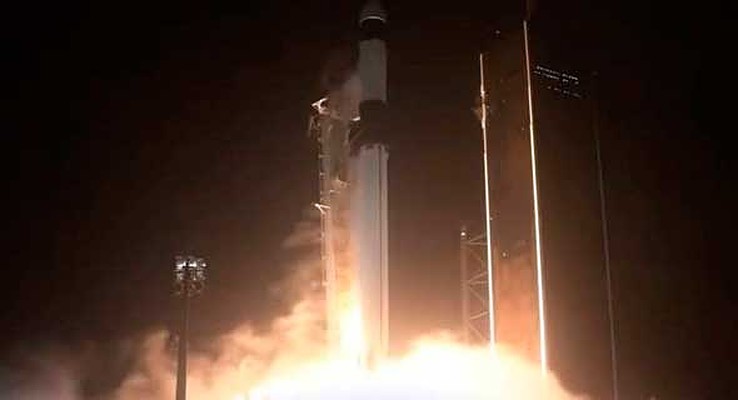TAU launched the nanosatellite on Dec. 21, 2021 aboard a SpaceX Falcon 9 rocket from the Kennedy Space Center in Florida.
By Yafit Ovadia, Calcalist
Tel Aviv University recently launched the TauSat-3 satellite to space, which is designed to test a new technology for protecting space systems from cosmic radiation, after successfully reaching the International Space Station (ISS) on Sunday. TAU launched the nanosatellite on Dec. 21, 2021 aboard a SpaceX Falcon 9 rocket from the Kennedy Space Center in Florida. It was later transferred to the International Space Station via the Cargo Dragon C209 spacecraft, and made contact on Sunday.
The “COTS-Capsule” will be included as part of the series of 43 experiments that second-Israeli astronaut Eytan Stibbe will take part in during his 10-day mission to the ISS in February as part of the “Rakia” (Sky) mission guided by the Ramon Foundation and the Israel Space Agency. In addition to the academic research, the space mission is leveraging and promoting an educational-scientific program in the field of space and radiation.
Within the TauSat-3 is the “COTS-Capsule,” an innovative space mechanism that can detect and mitigate cosmic-ray induced damage to electronic space systems. The satellite was successfully installed and put into operation aboard the station, and connected via the ISS datalink network and has communicated with ground stations. The nanosatellite, which is approximately the size of a shoebox, was designed and built by the university’s team of experts. It will examine the performance of novel radiation detection and active protective mechanisms to guard electronics from cosmic radiation induced hazardous phenomena. It will enable the use of modern commercial electronic systems in space, by incorporating them into the protected environment inside the capsule, and operating them in that specific environment. TAU relayed that its technological implications have significant economic impact.
The study was headed by PhD candidate Yoav Simhony, from the School of Electrical Engineering, together with the head of the School of Physics and Astronomy, Prof. Erez Etzion and Prof. Ofer Amrani from the Iby and Aladar Fleischman Faculty of Engineering, head of the Small Satellite Laboratory. Dolev Bashi, Elad Sagi, Dr. Yan Benhammou, Dr. Igor Zolkin, Dr. Meir Ariel, Baruch Meirovich, Orly Bloomberg, Edward Karat, Lily Almog, Yasmin Miller Zangi and the legal team, and several TAU students from the departments of electrical engineering, software, and physics also participated in the project as well as Dr. Alex Segal of the Afeka College of Engineering. NASA, Nanoracks, the Ehrlich, Samuel Berkowitz, and Herzog, Fox & Ne’eman law firms, Arotec Ltd., and Israel Aerospace Industries also took part.
“Currently, electronic equipment sent to space must be specifically modified to prevent cosmic radiation induced effects. The protection provided by the COTS-Capsule will enable the use of commercial off-the-shelf components in space, thus opening the door to the use of advanced electronic components, while significantly shortening both development times and reducing the costs of space products,” said Simhony.
Bring Joy to Israeli Soldiers - Send Winter Care Packages!
We are honored to thank the young men and women of the IDF who risk their lives every day to defend the citizens of Israel.
Join us in sending winter care packages and personal notes of support to Israeli soldiers who are out in the cold all day.
Warm up a soldier's heart with essential winter wear including fleece jackets, hats, gloves and more. Keep an entire unit warm!
THE SOLDIERS REALLY APPRECIATE YOUR LOVE AND CONCERN!
Click Here to Send Your Gift and Personal Note to Israeli Soldiers
